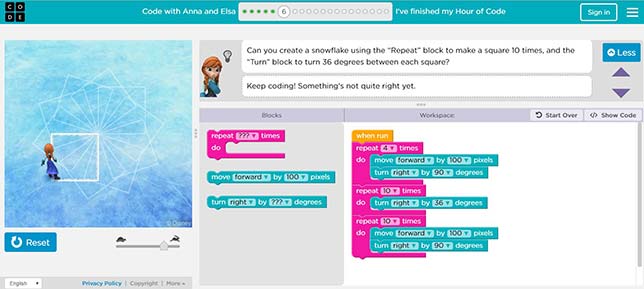Code.org Releases Free CS Course for Grades 7-9
- By Dian Schaffhauser
- 07/13/17

As promised in March, Code.org, which runs Hour to Code, has released new curriculum for grades 7 to 9, along with teacher guidance. "CS Discoveries," as it's called, fits between the organization's existing courses, "CS Fundamentals" (for lower grades) and "CS Principles" (for high school). Students need no experience with computer science or programming; but if they have it, the developers asserted, with the new lessons they'll be able to review "familiar topics in novel and more challenging contexts."
Each of the six units that make up the curriculum includes lesson plans and "code studio." The latter are videos and hands-on activities that guide the students through creation of programs. For example, for one early lesson students use visual programming tool Blockly to direct Elsa and Anna from Frozen in creating ice patterns. The video is introduced by Lyndsey, an actor, fashion model and programmer who writes her own apps. After a few test runs, Paola, a developer with Microsoft, steps in to explain looping.
Units cover problem solving, web development, animations and games and design, as well as data and society and physical computing. The content is available in 51 languages.
Materials for teachers include "detailed" lesson plans and teaching tips. There's also an online forum for community support as well as a more formal professional development program, which is taking contact names for the 2018-2019 training. Training for the upcoming school year has already taken place. More than 800 teachers representing 30,000 children received a week of training. Each teacher will receive a free or subsidized classroom kit (depending on their schools' free-and-reduced-lunch populations) with Adafruit Circuit Playground Classic boards, which help students to learn the physical computing lessons.
An introduction to CS Discoveries is on the Code.org website here. The course begins with Unit 1 here. All the lessons are openly published under a Creative Commons BY-NC-SA 4.0 license.
About the Author
Dian Schaffhauser is a former senior contributing editor for 1105 Media's education publications THE Journal, Campus Technology and Spaces4Learning.